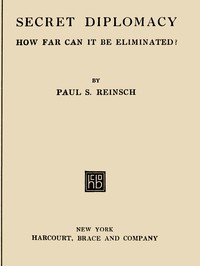| Author |
Reinsch, Paul S. (Paul Samuel), 1869-1923 |
| LoC No. |
22003117
|
| Title |
Secret Diplomacy: How Far Can It Be Eliminated?
|
| Note |
Reading ease score: 41.4 (College-level). Difficult to read.
|
| Contents |
Eighteenth century diplomacy -- Old diplomatic correspondence -- After the congress of Vienna -- Napoleon III, Disraeli, Bismarck -- Triple Alliance diplomacy and Morocco -- Entente diplomacy -- The crisis of 1914 -- The secret treaties of the war -- Hopes for improvement deferred -- The destruction of public confidence -- Parliament and foreign affairs -- The public and diplomacy -- A survival of absolutism -- Recent American experience -- Conclusion.
|
| Credits |
Charlie Howard and the Online Distributed Proofreading Team at https://www.pgdp.net (This file was produced from images generously made available by The Internet Archive/American Libraries.)
|
| Summary |
"Secret Diplomacy: How Far Can It Be Eliminated?" by Paul S. Reinsch is a scholarly examination of diplomacy, particularly focusing on the role and implications of secrecy in international relations, written in the early 20th century. The book tackles the historical and practical aspects of secret diplomacy, questioning whether it serves as a necessary tool of statecraft or as an impediment to peace and transparency among nations. The author engages with notable figures and historical examples, illustrating the continuing relevance of diplomatic secrecy in contemporary politics. The opening of the work sets the stage for a deep inquiry into the nature and consequences of secret diplomacy. Reinsch poses compelling questions about its moral and political implications, arguing that such practices foster distrust among nations, perpetuating an environment conducive to hostility and conflict. He discusses the tension between democratic ideals and the often clandestine nature of diplomatic agreements, positing that greater transparency may be essential for building international confidence and cooperation. Utilizing a blend of historical context and critical analysis, Reinsch establishes a strong foundation for the discussions that follow in the subsequent chapters. (This is an automatically generated summary.)
|
| Language |
English |
| LoC Class |
D: History: General and Eastern Hemisphere
|
| Subject |
Europe -- Politics and government
|
| Subject |
Diplomacy
|
| Category |
Text |
| EBook-No. |
64671 |
| Release Date |
Mar 2, 2021 |
| Copyright Status |
Public domain in the USA. |
| Downloads |
69 downloads in the last 30 days. |
|
Project Gutenberg eBooks are always free!
|

